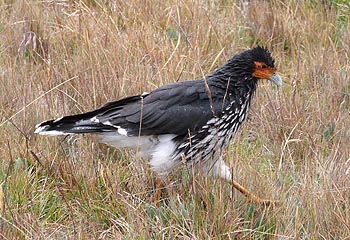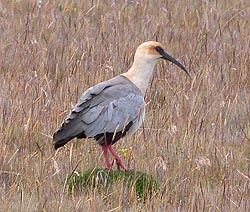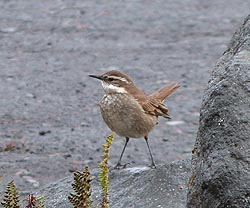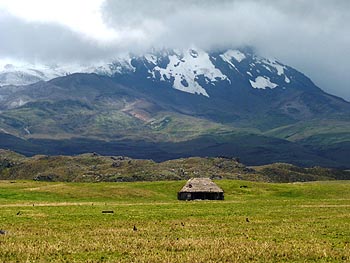|
Higher up on the plateau we scan for Andean Lapwings, Páramo Ground-Tyrant and the local specialty, the Black-faced Ibis. This isolated population is at the northern extreme of the species range and is considered endangered in Ecuador. Black-winged Ground-Dove is abundant in flocks along with Eared Dove. Streak-backed Canasteros haunt the drier areas. Carunculated Caracaras are seen in large numbers often walking and scratching in the fields. Puna Hawks are also commonly seen soaring along the ridges and hovering (like Rough-legged Hawks). Given good visibility we have a good chance of seeing Andean Condor, one of the largest populations found in Ecuador as well as Black-chested Buzzard-Eagle. With more luck we might see the rare Cinereous Harrier and Aplomado Falcon (subspecies pichinchae).
Arriving at Lake Mica with our box lunch, we survey the lakeshore bustle of Andean Gulls, Andean Coots, Andean and Blue-winged Teals, Andean Ruddy Ducks, and Yellow-billed Pintails. This is also the best place in Ecuador to observe closely the regal Silvery Grebe. Also, large mammals which are notoriously shy in the tropics are often seen at the reserve such as the South American Fox and White-tailed Deer.
Heading back to Quito with a pretty sunset en route, we arrive at the hotel for dinner.
See the Antisana Birdlist.
 Back to top Back to top 

Carunculated Caracara
|

Black-faced Ibis
|

Bar-winged Cinclodes
|
|

Antisana Volcano
Tour Information
Price per person: Click here for prices
Included: Box lunch, expert bilingual birdguide, transportation and entrance fee.
Not included: Last night dinner; drinks; tips.
See our Payment and Cancellation Policy page for important information.
|